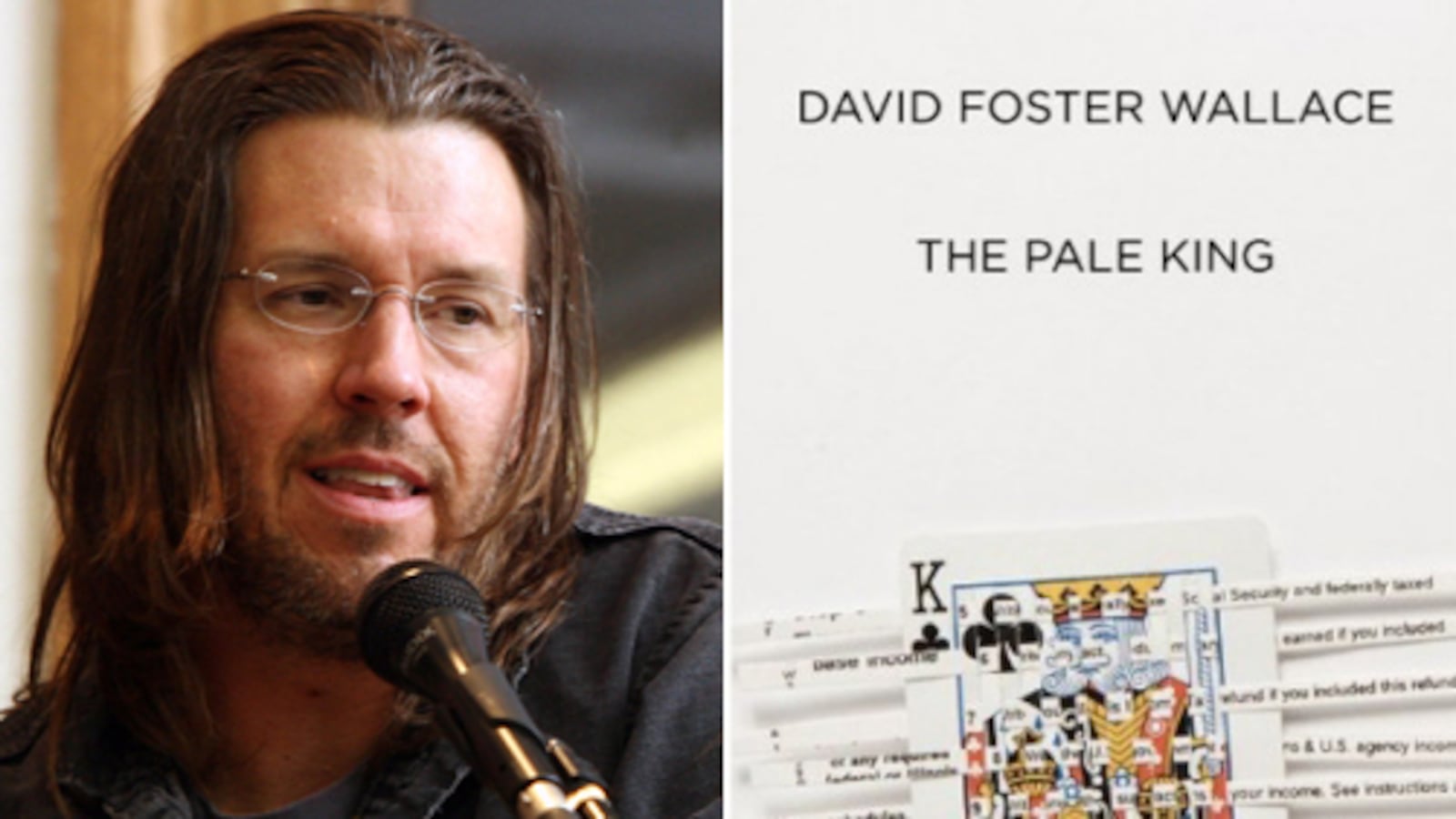Do tax collectors sometimes drive ice-cream trucks? Do special Social Security numbers set them apart from the rest of society? Was American novelist David Foster Wallace among them?
Those are just a few of the questions raised by Wallace’s chronicle of tax collectors, The Pale King, posthumously published last year on Tax Day and recently named a Pulitzer Prize finalist. In it, Wallace charts lives much quieter than those in his masterwork Infinite Jest, which featured Canadian spies, tween tennis-academy angst, and knuckle-whitening battles with addiction.
Still, the unfinished Pale King is harrowing in its descriptions of inner demons. It’s another challenging and visceral read.
It also has something Infinite Jest didn’t: it’s set in a very real world. Most of the action plays out in 1980s Peoria, and the characters are sophisticated portraits of Americans: the poor, the Christian, the immigrants, the orphans, the dutiful, the beautiful, and the overly sweaty.
Wallace, known for his intense research ethic for works of journalism and fiction, spent years on the book. He didn’t just study tax texts, he also mingled with accounting students, professors, and professionals.
The work stunned Wallace’s editor Michael Pietsch, who assembled the novel from stacks of chapters the author left behind after he took his life in 2008.
“The thing that amazed me when I read everything he’d written was he had carved a statue into a mountainside,” Pietsch said. “He’d really written deep, deep, deep into this book and these characters, and explored these ideas with extraordinary both depth and subtlety.”

D.T. Max, author of a forthcoming biography of Wallace, said the new book could have an even wider fan base than Jest.
“Infinite Jest, which I consider undeniably a masterpiece, is still a tough book to read,” Max said. “The Pale King, which is still unfinished, is in a way more approachable.”
But for all its emotional reality, what about the seemingly impossible IRS lore it contains?
Here’s a fact check of The Pale King based on interviews and an examination of his working papers at the University of Texas Austin’s Ransom Center.
IN THE EVENT OF NUCLEAR WAR
The Pale King: The IRS produced studies on how it should collect taxes in case of nuclear war, called “Fiscal Planning for Chaos.”
True? This fact is reported in one of the books Wallace used for his research, Martin Kaplan’s What the IRS Doesn’t Want You to Know, which quotes an IRS manual addendum: “In the event of a nuclear attack, to guide the conduct of all IRS employees, operations will concentrate on collecting taxes which will produce the greatest revenue yields.” Verification comes by way of an Associated Press story from 1989.
TAXMEN DRIVING ICE-CREAM TRUCKS?
The Pale King: Agents reporting for duty hear the tinkle of an ice-cream truck as they’re bussed from the airport. The reason? An ice-cream company’s vehicles were seized, and as an agent named Bondurant says, “everybody below (government pay level) G-11 now rides in Mr. Squishee trucks.”
True? It was probably a concept Wallace got from The Ultimate Rip-off, another IRS novel. In his copy of the book he underlined a section on seizures. There aren’t any prominent cases of IRS agents cruising around in ice-cream trucks. But it’s not impossible. According to one regulation, it would just require the trucks to be an upgrade over inferior IRS-owned vehicles. That could be in the eye of the beholder.
IRS BONA FIDES
The Pale King: “All of this is true. This book is really true,” Wallace writes in an author’s foreword that starts about 70 pages in. He promises the reader that Pale King is his memoir based on time working at the IRS after getting kicked out of college for running an academic paper mill.
True? Well, no. The real Wallace was busy writing, earning the MacArthur “genius” award that later terrified him (“Boy am I scared. I feel like throwing up … I don’t feel like a Genius,” he wrote in the margins of some notes he took on taxes). Wallace didn’t just flip through a few tax books—he also took accounting courses at his employer, Illinois State University, from 1996 through 1998. He rarely asked his fellow professors to grade his work: on one quiz when he did, he earned a 10/10 and a “Perfect!” In 2005 he corresponded with tax lawyers and did more IRS research. He took hundreds of pages of notes and thoroughly marked up quintessential tax texts like West’s Federal Taxation.
So, sure, the book is fiction. But if the 99th percentile boredom felt by Wallace’s IRS auditors seems real, there’s a reason: Wallace dove in to the subject matter like a method actor.
GHOSTLY COLLECTOR
The Pale King: “From the Peoria Journal Star, Monday November 17, 1980 ... Supervisors at the IRS’s regional complex in Lake James township are trying to determine why no one noticed that one of their employees had been sitting dead at his desk for four days before anyone asked if he was feeling all right.”
True? According to the Peoria Journal Star’s librarian, Merry Rebholz, that death isn’t in the paper’s files. “We would have put it in our ‘unusual dead’ file,” Rebholz said. “It’s not there.” But incidents of workers found dead on the job after a few days do occur. Last year, long after the writing of The Pale King, a compliance auditor was found that way in California. This one’s true in spirit.
BORN AGAIN, TO THE NINES
The Pale King: “Little-known fact: The only US citizens anywhere whose Social Security number start with the numeral 9 are those who are, or at some time were, contract employees of the Internal Revenue Service.” Instead, service members are “born-again” when they enlist, their previous number discarded: “The Service knows its own, always.”
True? It reads credibly, and even took in Wallace’s editor when he went through stacks of manuscript after his death: “I for one, and many others, took at absolute face value his declaration that each person who becomes an IRS agent gets a new Social Security number that starts with nine,” Pietsch said in an interview. “I checked into it and found it wasn’t true and thought, ‘Hah, good one!’”
QUOTAS
The Page King: “On the public level, the Service has always denied quotas as gauges of work performance.” In reality, Wallace says that “wigglers,” the workers who screen returns, pick out ones to audit based on ease and profitability.
True? Wallace underlined his copy of Kaplan’s book, including some of this passage: “Part of the collection mentality is formed and predicated on quotas, even though they may not be called that. This is something the IRS vehemently denies, but quotas nevertheless seem to exist.” Independent corroboration that quotas were once in place comes from this Los Angeles Times report that in 1997, IRS Commissioner Michael P. Dolan told Congress that agents would stop using them.
MOTTO?
The Pale King: The IRS motto is “Alicui tamen faciendum est” which means “He is the one doing a difficult, unpopular job.”
True? “We generally have a policy here that we don’t comment on novels or other works of fiction,” said IRS spokesman Anthony Burke. Burke did, however, confirm the IRS doesn’t have an official motto. What it does have on the face of its building in Washington, is a quote from Justice Oliver Wendell Holmes: “Taxes are what we pay for a civilized society.”





